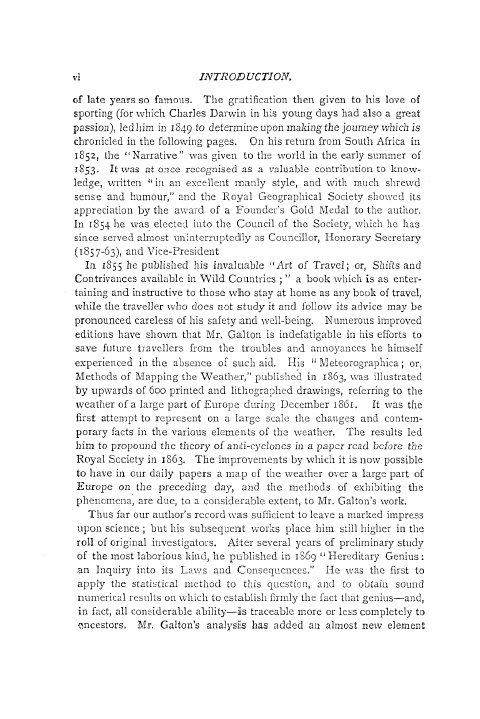vi INTRODUCTION.
of late years so famous. The gratification then given to his love of sporting (for which Charles Darwin in his young days had also a great passion), led him in 184.9 to determine upon snaking the journey which is chronicled in the following pages. On his return from South Africa in 1852, the "Narrative" was given to the world in the early summer of 1853. It was at once recognised as a valuable contribution to knowledge, written " in an excellent manly style, and with much shrewd sense and humour," and the Royal Geographical Society showed its appreciation by the award of a Founder's Gold Medal to the author. In 1854 he was elected into the Council of the Society, which lie has since served almost uninterruptedly as Councillor, Honorary Secretary (1857-63), and Vice-President
In 1855 he published his invaluable "Art of Travel; or, Shifts and Contrivances available in Wild Countries ; " a book which is as entertaining and instructive to those who stay at home as any book of travel, while the traveller who does not study it and follow its advice may be pronounced careless of his safety and well-being. Numerous improved editions have shown that Mr. Galton is indefatigable in his efforts to save future travellers from the troubles and annoyances he himself experienced in the absence of such aid. His " Meteorographica ; or, Methods of Mapping the Weather," published in 1863, was illustrated by upwards of 6oo printed and lithographed drawings, referring to the weather of a large part of Europe during December 1861. It was the first attempt to represent on a large scale the changes and contemporary facts in the various elements of the weather. The results led him to propound the theory of anti-cyclones in a paper read before the Royal Society in 1863. The improvements by which it is now possible to have in our daily papers a map of the weather over a large part of Europe on the preceding day, and the methods of exhibiting the phenomena, are due, to a considerable extent, to Mr. Gallon's work.
Thus far our author's record was sufficient to leave a marked impress upon science ; but his subsequent works place him still higher in the roll of original investigators. After several years of preliminary study of the most laborious kind, lie published in 1869 " Hereditary Genius an Inquiry into its Laws and Consequences." He was the first to apply the statistical method to this question, and to obtain sound numerical results on which to establish firmly the fact that genius-and, in fact, all considerable ability-is traceable more or less completely to Oncestors. Mr. Galton's analysis has added an almost new element

